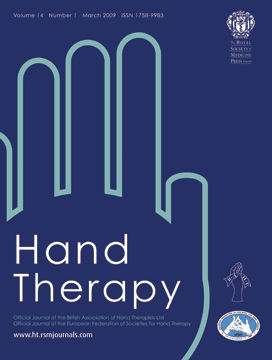
Hand Therapy
Scope & Guideline
Exploring New Frontiers in Orthopedic Care
Introduction
Aims and Scopes
- Clinical Rehabilitation Techniques:
The journal emphasizes research on various rehabilitation methods, including the effectiveness of different therapeutic interventions such as splinting, exercise programs, and innovative technologies like 3D-printed orthoses. - Patient-Centered Care:
There is a strong focus on understanding patient experiences, perceptions, and outcomes, highlighting the importance of involving patients in decision-making processes and tailoring interventions to meet their needs. - Evidence-Based Practice:
The journal encourages systematic reviews and meta-analyses that evaluate the efficacy of treatments and interventions in hand therapy, supporting clinicians with evidence to guide their practice. - Occupational Therapy Integration:
Research that explores the integration of occupational therapy principles into hand therapy practices is a core area, acknowledging the significance of occupation-centered approaches in rehabilitation. - Assessment and Measurement Tools:
The development and validation of assessment tools for measuring outcomes in hand therapy, including pain, function, and psychological impacts, are critical components of the journal's scope.
Trending and Emerging
- 3D Printing in Orthotics:
The incorporation of 3D printing technology for creating customized orthoses is gaining attention, showcasing innovation in treatment options and enhanced patient outcomes. - Qualitative Research on Patient Perspectives:
There is a growing emphasis on qualitative studies that explore patient perceptions and experiences, which are essential for understanding the impact of therapy on quality of life. - Interdisciplinary Approaches to Rehabilitation:
Research that integrates multiple disciplines, such as psychology and occupational therapy, into hand therapy practices is emerging, highlighting the need for holistic treatment strategies. - Telehealth and Remote Rehabilitation:
The use of telehealth in upper limb rehabilitation is trending, particularly in response to the demands for accessible care solutions, underscoring the need for research on its effectiveness and implementation. - Focus on Mental Health in Hand Therapy:
Emerging studies are addressing the intersection of mental health and physical rehabilitation, particularly how psychological factors influence recovery and treatment adherence.
Declining or Waning
- Traditional Splinting Techniques:
Research on conventional splinting methods appears to be waning as newer, more innovative approaches, such as 3D printing, gain traction in therapeutic practices. - Generalized Pain Management Strategies:
There is a noticeable decline in studies focused solely on generalized pain management techniques, as more specific and tailored interventions for hand conditions are being prioritized. - Basic Rehabilitation Protocols:
The exploration of basic rehabilitation protocols for common hand conditions seems to be decreasing, reflecting a shift towards more complex, individualized treatment plans that consider the multifactorial nature of hand therapy. - Longitudinal Studies on Post-Surgical Outcomes:
While there has been significant focus on immediate post-operative care, the trend towards long-term follow-up studies assessing outcomes over extended periods appears to be diminishing. - General Occupational Therapy Studies:
Research that broadly addresses occupational therapy without a specific focus on hand therapy may be losing relevance, as the field increasingly emphasizes specialized, hand therapy-focused interventions.
Similar Journals

Obere Extremitaet-Schulter-Ellenbogen-Hand-Upper Extremity-Shoulder Elbow Hand
Enhancing Outcomes in Shoulder, Elbow, and Hand TreatmentsObere Extremitaet-Schulter-Ellenbogen-Hand-Upper Extremity-Shoulder Elbow Hand, published by Springer Heidelberg, is a significant journal within the fields of Orthopedics and Sports Medicine as well as Surgery, showcasing a commitment to advancing knowledge and practice in the management of upper extremity conditions. With an ISSN of 1862-6599 and E-ISSN 1862-6602, this journal plays a crucial role in disseminating high-quality research findings, clinical studies, and innovative methodologies from 2007 through 2024. Despite its current Q3 ranking, the journal aims to enhance its visibility and impact among peers, contributing valuable insights and setting a foundation for future advancements in surgical techniques and orthopedic treatments. This journal does not currently offer Open Access, yet provides essential information that is vital for researchers, healthcare professionals, and students dedicated to improving outcomes in upper extremity care. Interested readers are encouraged to explore groundbreaking research that addresses key challenges and developments within this specialized field.
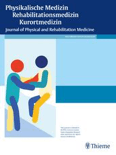
PHYSIKALISCHE MEDIZIN REHABILITATIONSMEDIZIN KURORTMEDIZIN
Connecting Professionals: A Hub for Rehabilitation AdvancementsPHYSIKALISCHE MEDIZIN REHABILITATIONSMEDIZIN KURORTMEDIZIN, published by GEORG THIEME VERLAG KG, is a prominent journal dedicated to the fields of physical medicine, rehabilitation, and resort medicine. With its ISSN of 0940-6689 and E-ISSN 1439-085X, this journal has been at the forefront of disseminating essential research and innovative practices since its inception. Operating from Germany, it offers a crucial platform for professionals, researchers, and students engaged in exploring the latest advancements in rehabilitation methodologies and therapeutic practices. Although it currently holds a Q4 ranking in several categories including Physical Therapy and Rehabilitation, the journal is committed to enhancing its impact and visibility within the academic community. The journal publishes research, reviews, and clinical studies aimed at improving patient outcomes and advancing the science of rehabilitation. Subscribers can expect high-quality content that addresses both theoretical and practical aspects of rehabilitation medicine, ultimately contributing significantly to ongoing discussions and developments in the field.

Physical Therapy
Exploring New Frontiers in Rehabilitation and Sports Therapy.Physical Therapy is a leading journal in the field of rehabilitation sciences, published by Oxford University Press Inc. Renowned for its rigorous peer-reviewed articles, the journal covers a broad range of topics within physical therapy, sports therapy, and rehabilitation, making it a vital resource for researchers, clinicians, and students. With an impressive impact factor and ranking—Q1 in its category (Physical Therapy, Sports Therapy and Rehabilitation) and ranked 19 out of 247 in Scopus—this journal stands at the forefront of advancing knowledge and practice in this vital health discipline. The journal has maintained its dedication to publishing original research, systematic reviews, and clinical studies since its inception in 1964, contributing significantly to evidence-based practices in the field. With a commitment to enhancing patient care and fostering professional development, Physical Therapy remains an essential platform for the dissemination of cutting-edge research and innovative therapeutic techniques.
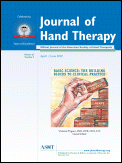
Journal of Hand Therapy
Navigating contemporary challenges in hand therapy.Welcome to the Journal of Hand Therapy, a premier publication dedicated to advancing the field of hand therapy through rigorous research and clinical insights. Published by Hanley & Belfus-Elsevier Inc, this esteemed journal, with ISSN 0894-1130 and E-ISSN 1545-004X, has been a cornerstone for professionals since its inception in 1987. With a commendable impact factor and categorized in the Q2 and Q1 quartiles for Physical Therapy, Sports Therapy, Rehabilitation, and Medicine, it ranks among the top journals in its fields, listed at #46/161 and #78/247 respectively in Scopus rankings. The journal aims to disseminate innovative research, evidence-based practices, and comprehensive reviews, addressing contemporary challenges in hand therapy, making it an essential resource for researchers, practitioners, and students alike. With a commitment to enhancing patient care, Journal of Hand Therapy is your gateway to the latest developments and trends in this critical area of rehabilitation.
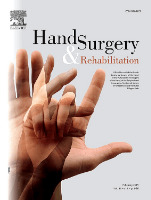
Hand Surgery & Rehabilitation
Connecting Clinicians with Cutting-edge ResearchHand Surgery & Rehabilitation, published by ELSEVIER, is a vital resource for researchers, clinicians, and students engaged in the fields of orthopedics, rehabilitation, and surgery. With an ISSN of 2468-1229 and an E-ISSN of 2468-1210, this journal has established a prominent presence since its inception in 2016, with a convergence period extending until 2024. It holds a commendable ranking in the Q2 category within Rehabilitation and Surgery, as well as a Q3 classification in Orthopedics and Sports Medicine for the year 2023. With a Scopus Rank of #290/551 in Surgery and #86/161 in Rehabilitation, it exemplifies the ongoing pursuit of excellence in its domain. As an open access journal, it provides a platform for sharing significant research findings and advancements in hand surgery and rehabilitation, thereby contributing to the enhancement of clinical practice and patient outcomes. Engaging with this journal places professionals at the forefront of the latest developments in these critical areas of medicine, promoting interdisciplinary collaboration and fostering innovation.
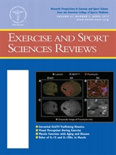
EXERCISE AND SPORT SCIENCES REVIEWS
Leading the way in evidence-based sports science.Exercise and Sport Sciences Reviews is a premier journal published by Lippincott Williams & Wilkins, dedicated to advancing the field of kinesiology and sports science. With a history dating back to 1973 and an esteemed reputation, this journal maintains a robust impact factor and is recognized in the top quartile for its categories, including Orthopedics and Sports Medicine, Physical Therapy, Sports Therapy and Rehabilitation, and Sports Science. Researchers and professionals in the areas of exercise physiology, rehabilitation, and sports medicine rely on this authoritative source for cutting-edge reviews and meta-analyses that inform clinical practices and improve athletic performance. Although the journal is not Open Access, its substantial contributions to evidence-based practices solidify its importance in guiding future research and policy in the health sciences. The insights shared within its pages are essential for professionals looking to stay at the forefront of their fields, encouraging the advancement of science through comprehensive literature reviews and critical discussions of contemporary issues.
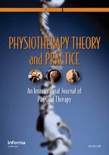
PHYSIOTHERAPY THEORY AND PRACTICE
Connecting Research and Clinical Practice in RehabilitationPHYSIOTHERAPY THEORY AND PRACTICE is a leading journal within the realm of physical therapy, sports therapy, and rehabilitation, published by Taylor & Francis Inc. With an ISSN of 0959-3985 and an E-ISSN of 1532-5040, this esteemed journal focuses on the interdisciplinary approaches and clinical practices that advance the science and application of physiotherapy. Ranking in the top 33% of its category as indicated by its Q2 status in the 2023 category quartiles, it serves as an essential conduit for innovative research and evidence-based practices. The journal has been a vital resource since its inception in 1985, continuing to attract contributions that explore the latest developments in rehabilitation and therapy strategies. Although currently not an Open Access journal, PHYSIOTHERAPY THEORY AND PRACTICE remains pivotal in shaping the landscape of health professions, providing insightful articles that empower researchers, practitioners, and students to enhance patient care and treatment strategies in an evolving field.
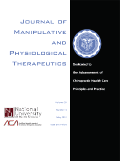
JOURNAL OF MANIPULATIVE AND PHYSIOLOGICAL THERAPEUTICS
Pioneering New Paths in Chiropractic and Physical TherapiesJOURNAL OF MANIPULATIVE AND PHYSIOLOGICAL THERAPEUTICS, published by MOSBY-ELSEVIER, is a leading peer-reviewed journal dedicated to advancing the field of chiropractic and physical therapies. With a strong impact factor and a prestigious Q1 classification in Chiropractics, it stands as an influential platform for disseminating innovative research, clinical practices, and evidence-based treatments since its inception in 1982. Positioned within the top quartile of health professions, this journal offers critical insights and cutting-edge findings, contributing significantly to our understanding of manipulation techniques and physiological interventions. Although currently not open access, the journal provides a comprehensive resource for researchers, practitioners, and students aiming to enhance patient care and therapeutic outcomes. As we look toward 2024, the JOURNAL OF MANIPULATIVE AND PHYSIOLOGICAL THERAPEUTICS continues to shape the future of chiropractic science and practice through its commitment to excellence and impactful scholarly contributions.
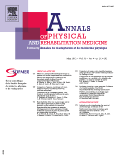
Annals of Physical and Rehabilitation Medicine
Elevating Standards in Physical Medicine ResearchAnnals of Physical and Rehabilitation Medicine, published by Elsevier France-Editions Scientifiques Medicales Elsevier, stands as a leading peer-reviewed journal in the fields of Orthopedics and Rehabilitation. With its ISSN 1877-0657 and E-ISSN 1877-0665, this esteemed journal is known for its high-quality research articles that significantly influence clinical practices and advancements in rehabilitation medicine. Recognized for its impact, the journal is categorized in the Q1 quartiles for both Orthopedics and Sports Medicine as well as Rehabilitation disciplines. According to the Scopus rankings, it ranks #5 out of 161 in Rehabilitation and #20 out of 321 in Orthopedics and Sports Medicine, illustrating its critical role in shaping the future of these fields with a remarkable 97th and 93rd percentile standing respectively. With a commitment to excellence, the journal publishes innovative research that addresses the evolving needs of both practitioners and patients, making it an essential resource for researchers, professionals, and students dedicated to improving rehabilitation practices. The journal operates under conventional access options, ensuring that its groundbreaking findings remain accessible to a wide audience.

Frontiers in Rehabilitation Sciences
Pioneering research that shapes the future of rehabilitation.Frontiers in Rehabilitation Sciences, published by FRONTIERS MEDIA SA, is an innovative open-access journal that has been committed to advancing the discipline of rehabilitation science since its inception in 2021. The journal aims to serve as a platform for researchers, clinicians, and students interested in disseminating high-quality research and insights that drive practice and policy in rehabilitation and physical therapy. With an E-ISSN of 2673-6861, it fosters interdisciplinary collaboration, tackling topics that range from therapeutic interventions to sports rehabilitation and beyond. As part of the Frontiers family, the journal employs cutting-edge open-access policies that ensure widespread dissemination and visibility of research findings. Although it is currently ranked within the lower quartiles based on Scopus rankings, the journal provides an invaluable opportunity for emerging scholars to publish their work in a rapidly evolving field. By sharing knowledge and fostering dialogue among scientists and practitioners alike, Frontiers in Rehabilitation Sciences plays a crucial role in shaping the future of rehabilitation methodologies and improving patient outcomes.